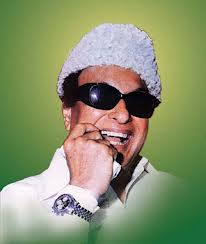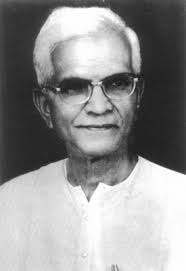Maruthur Gopalan Ramachandran, popularly known by his initials MGR, was an Indian film actor, producer and politician. Well known as a Tamil activist, he served as the Chief Minister of Tamil Nadu from 1977 until his death in 1987.
MGR was born in Nawalapitiya near Kandy, British Ceylon (present day Sri Lanka), to immigrant Keralite Nair parents Gopala Menon and Maruthur Satyabhama. (Nairs are traditionally matrilineal, hence he shares his matrilineal family surname "Maruthur"). His family was originally from Vadavannur, Palakkad, Kerala, but his father had migrated with his family to Ceylon.
MGR was a Hindu and portrayed himself as a devotee of Lord Murugan, as is common practice for many Hindus in Sri Lanka. This was during his early days. Later, when he joined the DMK,a pro-rationalist party,he followed the rationalist ideology, though not appearing very aggressively atheistic.However,in later days after he founded his own party following his expulsion from the DMK, he seems to have shown some leaning towards religious faith. He had asked his followers to pray for the success of his AIADMK party.
His followers even prayed for him when it was determined that he had a kidney illness. After his demise, his wife opened up a temple in his name. After his fathers death, he joined a drama troupe called Original Boys. Later, he entered the world of cinema, becoming an actor, and later a director, producer, and editor. MGR married Bargavi also known as Thangamani who died early due to illness. He later married Sathanandavathi who also died soon due to Tuberculosis. M. G. R. married V. N. Janaki a former Tamil film actress as his third wife after the death of his second wife. Janaki divorced her husband Ganapati Bhat, to marry MGR.
Making his film debut in 1935, in the film Sati Leelavati, directed by Ellis Dungan, an American born film director, Generally starring in romance or action films, MGR got his big breakthrough in the 1947 film Rajakumaari, written by M. Karunanidhi. He had the maximum number of all-time blockbusters to his credit at that time viz. Nadodi Mannan, Enga Veetu Pillai and Adimai Pen. He was shot by fellow actor Mohan R. Radha, affecting his ability to speak clearly. He won the National Film Award for Best Actor for the film Rickshakaran. His film Nadodi Mannan, which was produced and directed by himself and released in 1956, and ran to full houses.He also got Bharata ratna.
MGR was a member of the Congress Party till 1953 and he used to wear Kh?d?. In 1953 MGR joined the Dravida Munnetra Kazhagam (DMK) with the help of M. Karunanidhi. He became a vocal Tamil and Dravidian nationalist and prominent member of the DMK] ("Dravida Munnetra Kazhagam" aka Dravidian Progressive Federation). He added glamour to the Dravidian movement which was sweeping Tamil Nadu. He became a member of the state Legislative Council in 1962. He was first elected to the Tamil Nadu Legislative Assembly in 1967. After the death of his mentor, Annadurai, MGR became the treasurer of DMK in 1969 after Karunanidhi became the chief minister.
On the 12th of January 1967, he was shot in the neck by fellow actor M.R. Radha. The bullet was permanently lodged in his neck and his voice damaged. Within hours of the shooting, some 50,000-odd fans had gathered at the hospital where MGR had been taken. People cried in the streets shops closed. For six weeks, he lay in the hospital as fans awaited each report of his health. He was visited by a steady stream of commoners and luminaries of film industry, polity and bureaucracy. The shooting was supposed to be conspired by his unannounced political rival, M.Karunanidhi. From his hospital bed, he conducted his campaign for Madras Legislative Assembly. He won twice the number of votes polled by his Congress rival and the largest vote polled by any candidate for the Assembly.
In 1972, DMK leader Karunanithi started project his first son M.K.Muthu in a big way in film industry and also in politics. Understanding the tactics played by Karunanithi to corner him, MGR started to claim that corruption had grown within the party after the demise of Annadurai and in a public meeting asked for the financial details of the party to be publicized which enraged the leadership of DMK. Consequently, as expected, MGR was expelled from the party, and floated a new party named Anna Dravida Munnetra Kazhagam (ADMK), later renamed All India Anna Dravida Munnetra Kazhagam (AIADMK), the only powerful opponent of the DMK.He mobilised the period between 1972-1977 to spread and preach his party ambiition with films like Netru Indru Naalai(1974), Idhayakani(1975) etc..,. He became Chief Minister of Tamil Nadu on the 30th of July 1977, remaining in office till his death in 1987. In 1979, members of his party Satyavani Muthu and Aravinda Bala Pajanor, became the first non-Congress politicians from Tamil Nadu to be ministers in the Union Cabinet. The AIADMK won every state assembly election as long as MGR was alive. Although Anna Durai as well as Karunanidhi had acted in stage plays in trivial roles, in their younger days, before becoming chief minister, MGR was the first popular film actor to be a Chief Minister in India.
Once he became Chief Minister of Tamil Nadu, he placed great emphasis on social development, especially education. One of his most successful policies was the introduction of the "Mid-day Meal Scheme" introduced by the popular Congress Chief Minister and Kingmaker K Kamaraj to a nutritious Mid-day Meal Scheme in the Government-run and aided schools in Tamil Nadu, which encouraged underprivileged children to attend schools. He also introduced Womens Special buses. He set up a free school for the Cinema Technicians children in Kodambakkam called MGR Primary & Higher Secondary School which provided Free Mid-Day meals in the 1950s. He led the ADMK to victory in the 1984 assembly elections despite not taking part in the campaigning. At that time he was undergoing medical treatment in America and his images were broadcast in Tamil Nadu through cinema halls. This was an effective campaign tactic and ADMK won the elections claiming around 56% of assembly seats, indicating the depth of his popular support. He won his seat in a double landslide victory in 1984. He still holds the record of being the chief minister with the highest consistent longevity of more than a decade.
Karunanidhi claimed on 1 April 2009 and again on 13 May 2012 that MGR was ready for the merger of his party with the DMK in 1979, with Biju Patnaik acting as the mediator. The plan however failed, because Panruti Ramachandran, who was close to MGR acted as a spolier and later MGR changed his mind.




